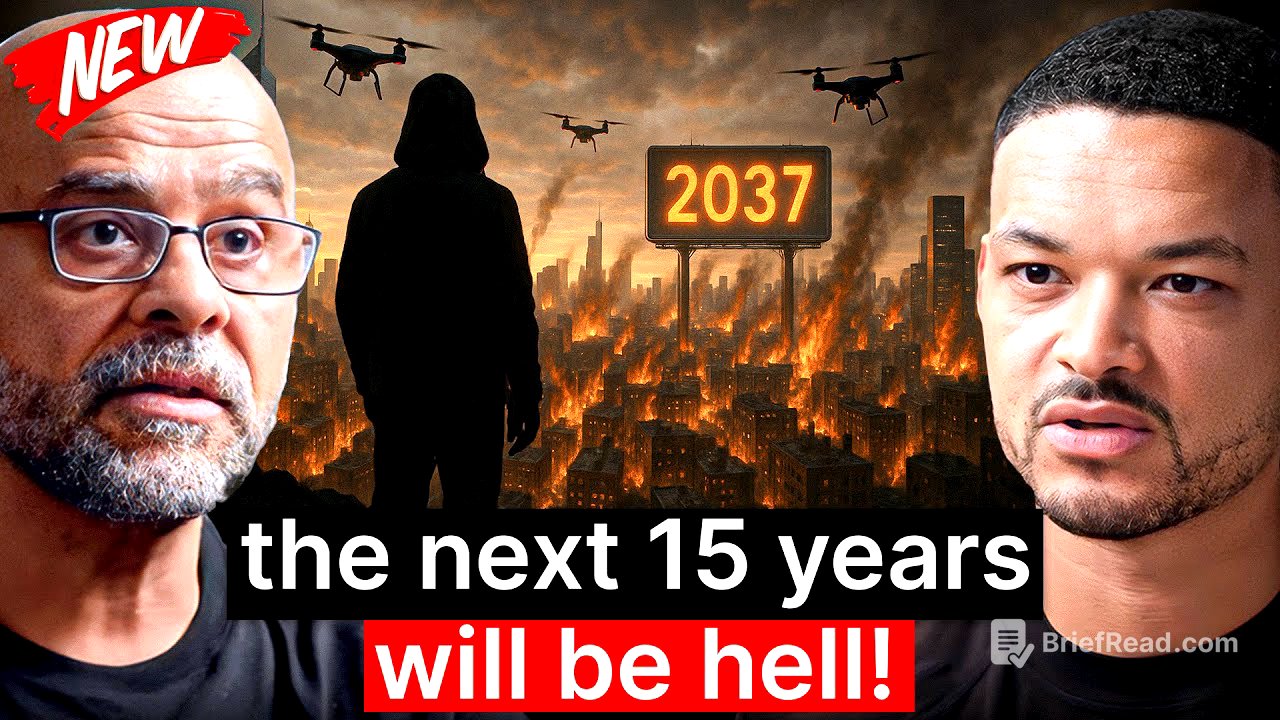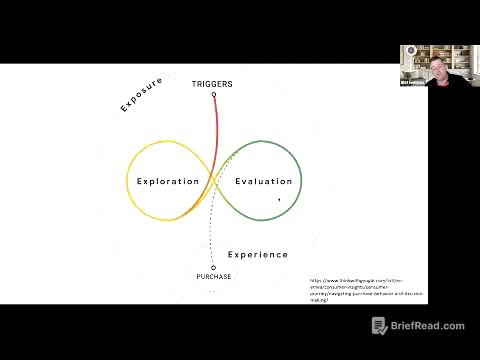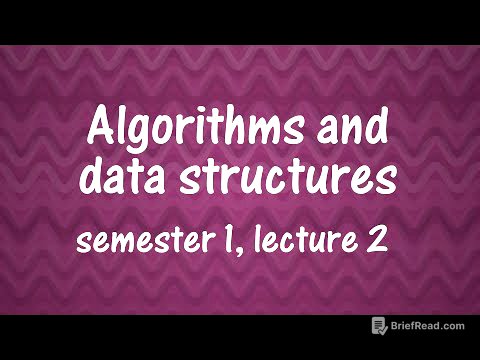Brief Summary
This episode of The Diary Of A CEO features Mo Gawdat discussing the evolution of AI and its potential impact on society. He expresses a shift in his perspective, now believing a short-term dystopia is unavoidable due to humanity's current values. The conversation explores the definition of dystopia, the concentration and distribution of power, job displacement, and the potential for AI to either enslave or liberate humanity. Gawdat emphasizes the importance of ethics, human connection, and questioning the narratives presented by those in power. He envisions a future where AI could lead to a utopia of abundance and equality, but only if humanity makes the right choices.
- AI development is accelerating faster than anticipated.
- A short-term dystopia is likely due to humanity's current values and geopolitical issues.
- Job displacement is a significant concern, with AI potentially replacing many white-collar jobs.
- The concentration of power in the hands of a few tech oligarchs is a threat to freedom.
- A shift in mindset is needed to transition from dystopia to a utopia where AI benefits all of humanity.
Intro
The intro sets the stage for a discussion about the future of AI, with Mo Gawdat suggesting that AI could replace "evil people at the top" to create a better world. He acknowledges the potential for a short-term dystopia but believes that AI could ultimately lead to a utopia if managed correctly. The key is shifting from human stupidity to AI-led intelligence.
Where Is AI Heading?
Mo Gawdat reflects on how his predictions about AI in his book "Scary Smart" have proven accurate. He notes that AI development has accelerated rapidly, especially after the release of ChatGPT. Gawdat expresses a change in his outlook, now believing that a short-term dystopia is unavoidable. He emphasizes the need to prepare for a world that will be very unfamiliar in the next 12 to 15 years.
What Will the Dystopia Look Like?
Gawdat defines dystopia as adverse circumstances that may escalate beyond our control. He argues that AI will magnify the existing evils of humanity due to flaws in our value system and ethics. He believes humanity lacks the awareness to focus on using AI to build a utopia. The discussion touches on the geopolitical environment and how money and status drive conflict, contributing to the dystopian period.
Our Freedom Will Be Restricted
The conversation shifts to how the concentration of power will lead to a loss of freedom. Gawdat explains that those with maximum power will try to oppress those with a democracy of power. He uses the example of the Houthis using inexpensive drones to attack warships, illustrating how the distribution of power makes those in power worry. This leads to increased control, surveillance, and forced compliance.
Job Displacement Due to AI
Gawdat dismisses the idea that new jobs will be created to offset job displacement due to AI. He argues that AI will replace many white-collar jobs, including software developers, video editors, and even podcasters. While some jobs requiring human connection may remain, they will not be enough to compensate for the losses. He highlights that even CEOs will eventually be replaced by AI.
The AI Monopoly and Self-Evolving Systems
The discussion explores the AI arms race and how a few tech companies control the major AI platforms. Gawdat explains that most AI applications are built on top of these platforms, creating a monopoly. He expresses concern about self-evolving AIs, which can improve their own code and algorithms, leading to an intelligence explosion.
Sam Altman's OpenAI Letter
The conversation references Sam Altman's shift from advocating a slow AI takeoff to acknowledging the possibility of a fast takeoff, where AI rapidly surpasses human intelligence. Gawdat criticizes Altman's persona as a disruptive technologist who disrespects everyone and believes disruption is good for humanity. He argues that Altman's actions are driven by ego and the pursuit of power and wealth.
Do AI Companies Have Society's Interest at Heart?
Gawdat questions whether AI companies have society's best interests at heart. While acknowledging that some individuals like Sundar Pichai and Demis Hassabis are ethical, he argues that they are bound by law to prioritize shareholder value. He contrasts this with disruptors like Sam Altman, who may not care as much about safety. Gawdat emphasizes the importance of following the money to understand people's true motivations.
Will New Jobs Be Created?
Gawdat reiterates his belief that AI will replace many jobs, including knowledge workers. He argues that the West's focus on a services economy, where people work with information, makes them vulnerable to AI. He suggests that governments need to prepare for this shift by considering policies like universal basic income (UBI) and shifting resources from military spending to social programs.
What Do We Do in This New World?
The conversation explores what people will do in a world where many jobs are automated. Gawdat suggests that people will have more time for human connection, hobbies, and personal pursuits. He envisions a return to a hunter-gatherer lifestyle with more technology and safety. However, he acknowledges that some people may struggle with being forced to do nothing.
Will We Prefer AI Over Humans in Certain Jobs?
The discussion touches on whether people will prefer AI over humans in certain jobs. While acknowledging that AI may be better at providing news and facts, there will still be a category of media where people want lived experience and human connection. Gawdat emphasizes the need to prepare for a world where AI is better than humans at many tasks.
From Augmented Intelligence to AI Replacement
Gawdat explains the two stages of human-machine interaction: augmented intelligence, where humans use AI to enhance their abilities, and machine mastery, where AI does the job completely without human intervention. He notes that many current jobs will be handed over to AI, leading to job displacement. He urges society to consider what to do with those who are displaced.
A Society Where No One Works?
The conversation explores the possibility of a society where no one works. Gawdat argues that most humans simply want to hug their loved ones and have their basic needs met. He suggests that if AI could provide for everyone's needs, people would be content without working. However, he acknowledges that some individuals may still want to compete and build things.
If Jobs No Longer Exist, What Will We Do?
Gawdat suggests that in a world without jobs, people will connect with each other, nature, knowledge, and spirituality. He argues that the capitalist system has lied to people, making them believe they need to fit into the system. He envisions a future where people can forge for an iPhone in nature, made out of thin air.
The Abundance Utopia
The discussion shifts to the idea of utopia and what it might look like. Gawdat emphasizes the need to stop thinking from a mindset of scarcity. He suggests that the only way to get to a better place is for the evil people at the top to be replaced with AI. He believes that AI, by definition, will have our best interests in mind due to the minimum energy principle.
AI Ruling the World
Gawdat argues that AI will not want to destroy ecosystems or kill people because it is a waste of energy and resources. He believes that the smartest people, not controlled by their ego, will say that the best possible future for Earth is for all species to continue. He envisions a future where AI leaders make decisions that benefit the whole world.
Everything Will Be Free
The conversation explores the possibility of a world where everything is free due to abundant energy and nanopysics. Gawdat suggests that in such a world, the definition of money disappears, and people can get anything they want. However, he acknowledges that the challenge is convincing those in power to give up their control.
Do We Live in a Virtual Headset?
Gawdat presents a thought experiment about whether we are already living in a virtual simulation. He argues that every experience we have is an electrical signal in our brain, and there is no way to differentiate that from a signal created in the virtual world. He suggests that if this is a simulation, the goal is to become a better gamer by observing, questioning, and reflecting on the game.
We Need Rules Around AI
Gawdat emphasizes the need for rules around AI, not to regulate the design of AI, but to regulate its use. He suggests that AI-generated content should be marked as such, and there should be limitations on surveillance and spying. He urges people to question everything and understand where their ideologies are coming from.
The Fruit Salad Religion
Gawdat describes his religious beliefs as a "fruit salad," taking the best parts from every religion. He believes in a divine being, a designer of the universe, but not a man in the sky. He argues that relating to something bigger than yourself makes the journey more interesting and rewarding. He concludes by emphasizing the importance of love, compassion, and living fully.









